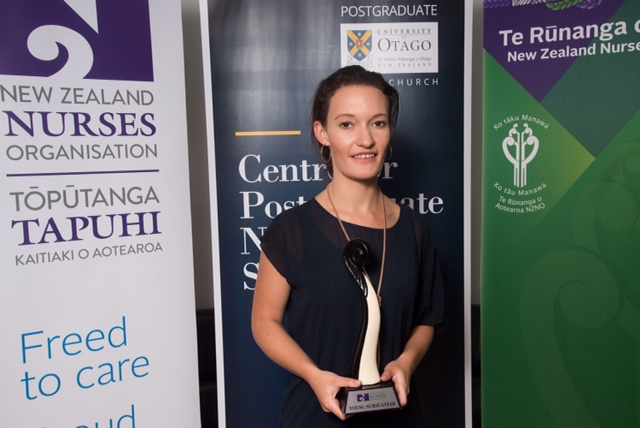A young nurse practitioner who is helping reduce distress and hospital visits for children with asthma and eczema in South Auckland has taken out this year’s Young Nurse of the Year award.
Shocked award winner Jess Tiplady flew back to Auckland this morning clutching an enormous bouquet of flowers, a beautiful trophy and an enormous certificate.
The 29-year-old, who became a primary health NP in April, was awarded NZNO Young Nurse of the Year 2017 at the organisation’s annual conference dinner at Te Papa last night.
The young NP is one of only four NPs under 35 and Tiplady (whose mother is Ngāi Te Rangi) is currently the youngest Māori nurse to have achieved NP status in New Zealand.
To become an NP by age 29, Tiplady has studied every year but one since first enrolling in nursing school. “It’s been a massive journey to get to here,” acknowledges Tiplady. She said she was shocked by her win, was very grateful, and felt the award was a reflection of how much others have helped her on her journey.
Kerri Nuku, NZNO’s kaiwhakahaere, said when presenting the award to Tiplady that she was a great example of a nurse making a positive contribution to health outcomes for New Zealand children living in poverty. “The impact on families living in overcrowded houses, with the associated infection, itch and discomfort of eczema, loss of sleep and potential for hospitalisation, is significant,” said Nuku.
Tiplady has worked for Manurewa’s Greenstone Family Clinic since graduating with a conjoint degree in nursing and health sciences from the University of Auckland.
Primary health has been her passion from the start and she says becoming an NP followed on from that passion as it seemed to be a “really useful tool”.
Early on at her time at Greenstone, she looked at how she could make a difference and saw a niche in helping prevent eczema crises for children and their families. “We were seeing a lot of children with nasty skin infections, and not sleeping and some very distressed children and parents.”
Around five years ago she started providing a nurse-led clinic in eczema for children to provide a whole package of care to support parents and reduce the risk of eczema flare-ups and distress.
A year later she set up an asthma clinic for children with the aim of using the clinical guidelines for good asthma care in primary health to see whether a focused clinic could make a difference to hospital admissions for asthma.
Invitations to the asthma clinic was tied in with the annual reminder letter sent to all children on preventative inhalers that it was time for their free flu vaccine. “We altered our annual letter to say come in and have a 30-minute appointment with a nurse to have your annual asthma check-up,” said Tiplady. “It was kind of a ‘warrant of fitness’ going into winter.”
She said in 2015 its practice admission rates for children with asthma halved compared with previous years, but it was very difficult to prove whether that was due to the asthma clinic or other factors. “But I think what we have managed to do is establish a really good model of care where our children are getting what is considered to be the best practice package of care for their asthma.”
Tiplady said about 80-110 children under 16 are eligible for the asthma clinic each year. She said she and other nurses chased up children where there might be barriers to coming into the clinic or grabbed an opportunistic clinic appointment if the child came into the practice for another reason.
While the young NP really likes working with children and young people – and has a special interest in mental health – her scope is primary care and her day-to-day work involves seeing a cross-section of patients across the practice’s population.
She also offers fortnightly clinics in James Cook High School and Alfriston College, predominantly in sexual health.
Tiplady was a member of the first cohort of the pilot Nurse Practitioner Training Programme (NPTP) and was mentored by two GPs at the Greenstone clinic. She said a particular aspect of NPTP that was particularly helpful was having two protected clinic days a week to focus on transitioning from being a nurse to being an NP.
After so many years of study, she says the focus for the next year was consolidating her knowledge and establishing herself in her role as an NP. “And then looking at where else I can utilise those skills as an NP. The clinical role is most important to me but the NP hat also offers the opportunity to do research, teaching and mentoring so I will look at where I can contribute in those areas.”
The Young Nurse of the Award was set up to recognise and celebrate the work of nurses in the younger age group and to encourage younger nurses to demonstrate their commitment to the nursing profession. The winner is chosen for showing compassion or courage beyond what is expected in their role as a nurse and who has improved care or health outcomes for their patients through their commitment to care, leadership, research or quality.
Kerri Nuku said she also warmly congratulated runner-up Dana Smith from Dunedin Hospital general surgery. Smith was nominated by her colleagues for her work in the community with children with Crohn’s disease including volunteering at their annual camps,” said.
The judging panel consisted of a representative from Otago University Centre for Postgraduate Nursing Studies, previous years’ award winners, the Ministry of Health’s Chief Nursing Officer (or representative), and the NZNO president and kaiwhakahaere.





















